Confucius says: We should keep the dead before our eyes, and honor them as though still living. The Chinese do just that every April during Qingming, Tomb-Sweeping Day. It is an occasion for the living to remember the dead. Families gather in cemeteries to tidy the tombs of their ancestors. Descendants provide support and comfort to their dead relatives in the afterlife by offering them food and drink and by burning incense. They also burn paper play money and other items made from paper such as clothing, jewelry, houses, cars, appliances – even iPads! It is believed that the family will have a prosperous year if they follow this custom. Qingming is an ancient tradition that dates back to 770-476 B.C. This year, the tradition will die for many Singaporeans.
| Watches |
 Haunting news in the city-state is the government’s plan to pave over another cemetery. Bukit Brown cemetery, one of the world’s oldest and largest Chinese graveyards outside of China, is slated for destruction. I first mentioned Bukit Brown in my blog entry, Rent in Peace. It is more than a cemetery. It is a nature preserve where gigantic, mature trees provide homes for a variety of birds and shade for nature lovers and joggers. It is an enchanting heritage site where the jungle entangles elaborate graves - some dating back to the1830s. The
Haunting news in the city-state is the government’s plan to pave over another cemetery. Bukit Brown cemetery, one of the world’s oldest and largest Chinese graveyards outside of China, is slated for destruction. I first mentioned Bukit Brown in my blog entry, Rent in Peace. It is more than a cemetery. It is a nature preserve where gigantic, mature trees provide homes for a variety of birds and shade for nature lovers and joggers. It is an enchanting heritage site where the jungle entangles elaborate graves - some dating back to the1830s. The
government will move this heavenly earth to make way for an 8-lane highway and public housing.
Brave souls have signed a petition to save Bukit Brown. In a country where it isn’t customary to lobby the government or speak out against the word of law, it is unlikely there will be enough signatures to bury the project. Earlier this month I returned to the cemetery as the sun was rising. A rooster was standing on a tomb heralding the new day. The agency in charge of the 5,000+ exhumation, the Land Transport Authority (LTA), had a banner stretching across the entrance with an office trailer underneath. The LTA will cover the cost of the removal, the cremation, and the columbarium at the only cemetery still in operation: Choa Chu Kang. Or, if the family prefers, the LTA will scatter the ashes at sea when it is convenient for the agency. If the living isn’t happy with the government options for the dead, then the family is expected to pay for the removal and all costs that arise from it.
My recent outing to Bukit Brown coincided with Qingming. It is inspiring to watch families celebrating on the tombs of their ancestors. After they weed and scrub clean the gravesite, they layout the food: chicken, oranges, rice, coffee, etc. To entice their ancestral ghosts to the feast, they burn joss stick (incense). One-by-one the relatives kneel before the headstone and pray. Next to the tomb sits the stack of paper joss (paper offerings) with the paper play money fanned throughout the pile. It is set aflame. Once the flame dies down, the family gathers around it and throws paper strips in the air while shouting “Huat! Huat! Huat!” Prosper! Prosper! Prosper!
The colorful paper mound turns to ash in seconds, but one color in Bukit Brown cemetery remains. Red-tipped sticks marking the graves slated for removal and red-slashed tree trunks marking the fall.














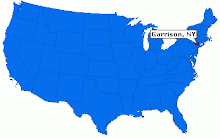



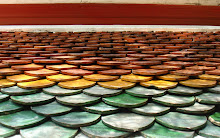
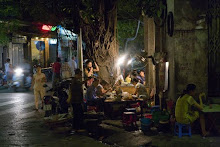
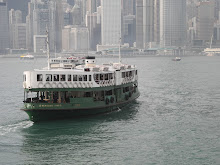
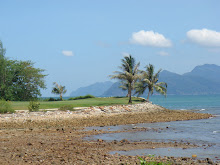
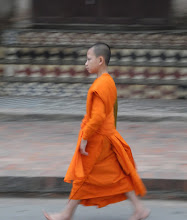
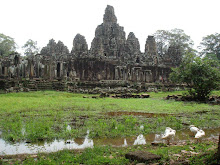
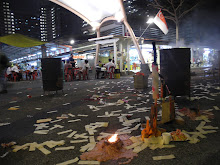
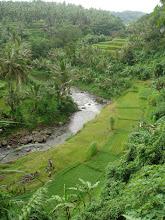
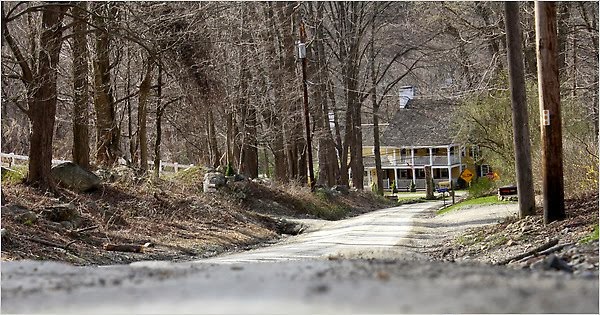

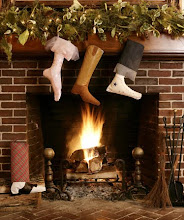






No comments:
Post a Comment